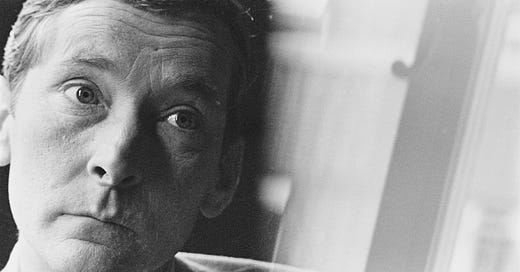There is a common perception that most comedians live secret lives of misery, and that their on-stage personas are acts of defiance against their private demons. For most of the comedians I know, this is very far from the truth. Yes, many of my former friends from the circuit are deeply bitter people. Some have difficulty in sustaining relationships. Others have apparently decided that hygiene is optional. But, on the whole, they seem to enjoy eking out their existences doing what they love best.
Kenneth Williams (1926-1988), on the other hand, certainly fit the archetype of the tortured comedic genius. At the age of twenty-one he wrote in his diary that he was a ‘suicidalist’ and that he didn’t ‘believe in existence at all’. Even on a gloriously sunny morning in December 1971, he could not help but see the downside: ‘It seems incredible that on such a day, someone, somewhere, is being murdered.’ His last words in his diary, written the night before he died of an overdose of barbiturates, were simply: ‘Oh, what’s the bloody point?’
Williams was a man of endless contradictions – a working-class snob, a self-hating narcissist, a prudish exhibitionist, a celibate who craved intimacy – and I suppose it was from these tortuous origins that his inimitable brand of comedy emerged. Watching him on old television interviews, I’m not only struck by his astonishing comic timing and acerbic turn of phrase, but how much of himself he concealed. His whole life was a performance. He seems like a character from a P.G. Wodehouse novel, but with a homosexual twist.
One of my earliest memories of television was Williams’s exuberant narration on the BBC cartoon Willo the Wisp. In later years, my father introduced me to the brilliance of Round the Horne – helmed by Kenneth Horne and starring Williams, Hugh Paddick, Betty Marsden and Bill Pertwee – which had been broadcast on BBC radio from 1965 till 1968. And although the Carry On films were also all produced before I was born, they were a mainstay of my childhood due to endless television repeats (Williams appeared in 25 of the 30 films from 1958 to 1978).
The Carry On films were unsophisticated slapstick affairs designed to make as much money as possible for their producer Peter Rodgers, but Williams threw himself into the roles with total conviction…
To continue reading this article, please consider becoming a paid subscriber…
Keep reading with a 7-day free trial
Subscribe to Andrew Doyle to keep reading this post and get 7 days of free access to the full post archives.




